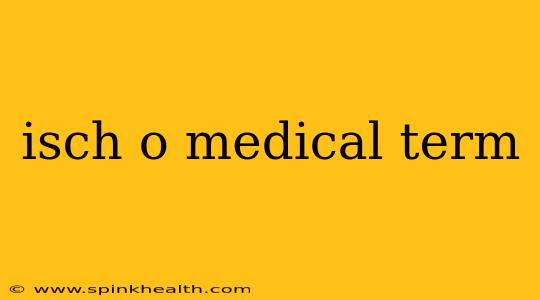Isch: Unraveling the Medical Mystery Behind This Prefix
The term "isch" isn't a standalone medical term itself. Instead, it's a prefix, a crucial component of several medical words indicating a condition of suppression, deficiency, or restriction of something. Think of it as a cryptic clue hinting at the underlying medical issue. Understanding "isch" opens the door to comprehending a whole family of related medical conditions.
Let's embark on a journey to unravel the meaning and usage of this enigmatic prefix, exploring various medical terms incorporating "isch" and illuminating their significance. Our investigation will also address common questions surrounding this prefix.
What does isch- mean in medical terms?
The prefix "isch" originates from the Greek word "iskein," meaning "to hold back" or "to restrain." In a medical context, this translates to a deficiency or suppression of a particular function or substance in the body. It often signifies a state of constriction or restriction, leading to reduced or impaired function.
This isn't a simple "on/off" switch; the degree of suppression varies considerably depending on the specific condition and its severity. It's a gradual process, often progressing from a subtle deficiency to a more pronounced impairment.
What are some medical terms that start with isch-?
Several important medical terms incorporate the "isch-" prefix. Let's explore some key examples:
-
Ischemia: This is perhaps the most common and widely recognized term incorporating "isch-." Ischemia signifies a restriction in blood supply to a body part, leading to a deficiency of oxygen and nutrients. This can affect various organs and tissues, leading to potentially serious consequences if left untreated. Imagine a river slowly silting up—the flow of blood, like the river's water, is restricted.
-
Ischuria: This term refers to the suppression or inability to urinate. It indicates a problem with the urinary tract, potentially due to obstruction, infection, or neurological issues.
-
Ischochoria: This less common term denotes a condition characterized by the suppression of the secretion of bile. Disruptions in bile flow can have significant implications for digestion and overall health.
These are just a few examples. The specific meaning of "isch-" always depends on the complete term and the context in which it's used.
What conditions cause ischemia?
Ischemia, as mentioned earlier, arises from reduced blood flow. Several factors can contribute:
- Atherosclerosis: The buildup of plaque in arteries narrows the passageway, reducing blood flow.
- Blood clots: A thrombus (blood clot) can completely or partially obstruct an artery.
- Vasospasm: A sudden constriction of blood vessels can temporarily restrict blood flow.
- External compression: Pressure on a blood vessel from a tumor or injury can compromise blood supply.
How is ischemia treated?
Treatment for ischemia varies greatly depending on the underlying cause and the affected area. Options can include:
- Medications: To dissolve blood clots, improve blood flow, or manage underlying conditions like high blood pressure.
- Surgery: To bypass blocked arteries or remove obstructions.
- Angioplasty: A minimally invasive procedure to widen narrowed arteries.
- Lifestyle changes: Dietary modifications, exercise, and smoking cessation.
Understanding the prefix "isch-" provides a foundation for comprehending a range of important medical conditions. While it doesn't represent a disease in itself, it acts as a crucial indicator, pointing toward deficiencies and restrictions within the body. Remember to always consult with a medical professional for diagnosis and treatment of any suspected medical conditions.

